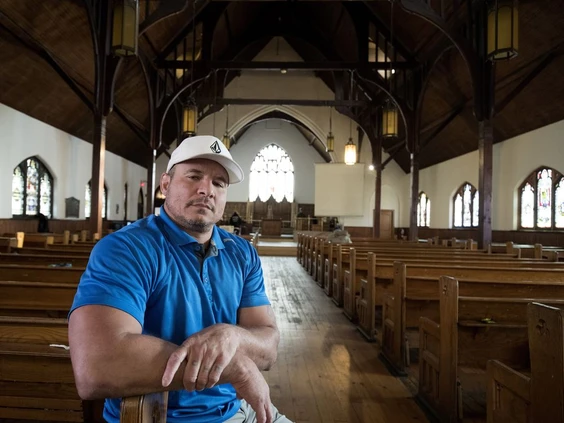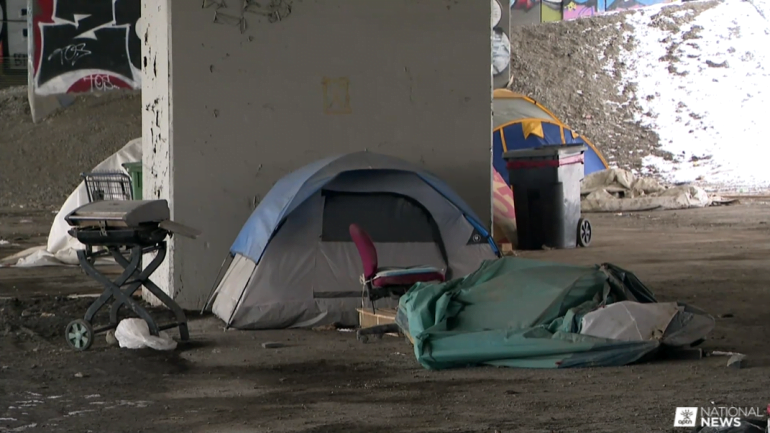« You can’t sell recovery until someone is ready to surrender themselves to it, » says Montreal street worker John Tessier, who’s been there.
Christopher Curtis • Montreal Gazette

John Tessier at the Westmount church that serves as the Open Door day shelter for the homeless. PHOTO BY ALLEN MCINNIS /Montreal Gazette
Part Two in a series of profiles about Westmount day centre the Open Door.
John Tessier may as well be the mayor of Cabot Square.
Most days he walks a beat stretching from the park along Atwater Ave. and into the network of alleys that slither behind the city — stopping every half-block or so to hold court.
If you’re homeless and hang out west of downtown, odds are you know John from the Open Door. He’s a street worker at the Westmount shelter and spends his time helping to get addicts into recovery.
Even in a crowded city park, it’s hard not to notice Tessier. His smile reveals two gold teeth and a pair of deep scars cut across the bridge of his nose.
Then there are his tattoos, which have the do-it-yourself look of prison ink. Tessier says he had the letters J-O-H-N carved into his fingers while serving time in a Florida penitentiary — the artist used a needle powered by the motor of a Walkman.
“I guess I don’t exactly blend in,” says Tessier, 46. “But out here, it comes in handy.”
Tessier doles out fist bumps, high fives and wraps his massive arms around people as he makes his way across Cabot Square. He’ll stop to chat and keep his ear trained for the latest gossip.
These talks keep Tessier plugged into the street: He’ll find out who’s sleeping outside and who’s found a place to crash, who’s ready to get sober and who’s several days into a bender.
Out here, most of the people will not be saved. They will try to quit drinking, smoking crack or shooting heroin but they’ll relapse. So Tessier just walks his beat and waits.
“You learn that you can’t sell recovery until someone is ready to surrender themselves to it.”
Take the case of “Chuck.” Just last year, he was so deep into substance abuse that he stalked through the shelter screaming and threatening others with brass knuckles.
Tessier managed to talk Chuck down that day. And last summer, after months of patience, he got Chuck a spot in rehab and helped him find an apartment.
“No matter how bad it gets, they have to know you’re going to be there,” he says. “Otherwise what’s the point of doing this?”
David Chapman, the Open Door’s director, says Tessier is uniquely qualified to work in the shadows of the city. That’s why he recruited him.
“John understands what goes on when the lights go out,” Chapman says. “He has real compassion for the people who spend night after night on the streets because, once upon a time, he was one of those people.”Article content
***
Sobriety came to Tessier in a “moment of grace” — the belief that God delivers even the most undeserving sinners.
He was in the bathroom of a downtown McDonald’s three years ago when he caught a glimpse of himself in the mirror. The man looking back at him was rail thin.
“It was just like, ‘What the f—? That’s enough,’” Tessier says.
Back then, Tessier would stay up for days at a time — bingeing on crack and cocaine until his body gave out. When it was finally time to crash, Tessier lumbered to the Anglican church on Atwater Ave., walked around back and passed out in the grass.
“In the morning, David (Chapman) would come by and wake me up,” Tessier says. “He’d say, ‘All right, John, time to come inside.’ I’d find a spot in one of the pews, sleep it off, wake up, start all over again.”Article content
Sometimes, though, Chapman and Tessier would sit and talk — about life, about Tessier’s faith, about how a successful salesman like him ends up sleeping outside every night.
Tessier’s early years are rife with the sort of trauma that would steer a person toward self-destructive behaviour. His father left when he was a toddler and Tessier’s mom was a heavy drug user.
She moved the family away from Quebec to start over with relatives in Florida. Tessier thrived in school and athletics. But he also fell in with a street gang.
The gang life landed him in prison and led U.S. authorities to deport Tessier in 2001. That meant he had to leave behind a son and a daughter in the States.
“I was lost and I did some things back then that I’ll always regret.” Article content
In Montreal, Tessier got his life together: he worked in sales, met a woman and they had a boy in 2007. But he also developed a cocaine addiction that ate away at him.
“You go from living in a nice apartment in Westmount with your family, to a less nice apartment in St-Henri, to renting a room in Verdun. Eventually, there’s nothing left. You’ve pushed everyone away and you’re sleeping on the ground behind a church.”
Chapman remembers the day Tessier asked for help to get into detox. He saw something good in him.
“He believed in me and he really didn’t have to,” Tessier says. “And in the end, I wanted to be that person for other people too.”
After detox, Tessier entered a 12-step program and started volunteering at the Open Door. When a job opened up last year, Chapman says he was the perfect fit.Article content
“We’re lucky to have him. He can speak to people about recovery because he lives through it every day.”
***
It’s an unseasonably warm evening in late fall and Tessier stops outside a dépanneur known for buying stolen goods.
“I wonder if they’d still recognize me,” he says. “Out here, there’s a black market for everything from electronics to stolen cheese. There are two pizzerias around here where they buy stolen mozzarella for cash.”
Some of the women he sees every day tease Tessier relentlessly.
One woman calls him “airaapik,” the Inuktitut word for brother-in-law, because her sister — we’ll call her Sharon — has a crush on him. As he walks by, Sharon winks at him, waves and they hug.
They all laugh.
It’s around dusk when Tessier walks by the laneway where Siasi Tullaugak died. They found her hanging one August morning on the railing of a Chomedey St. townhouse downtown.Article content
Tullaugak, 27, was a regular at the Open Door.
“That’s where they gave her chest compressions, right there on the pavement,” Tessier says. “That day, I remember it was such a hot day, and there was police tape everywhere. They said it was a suicide. No one out here believes that.” (Police have reopened an investigation into her death.)
He moves further into the alley, past some dilapidated apartment buildings where people sleep in the stairwells.
Then Tessier stops at a motel used to buy and sell crack. He peeks his head in the lobby and hears someone deadbolt the door shut.
“All I can do is be out here until they’re ready to give up and ask for help,” Tessier says. “I’m not saving anyone. If I weren’t helping people I’d still be on drugs. If anything, I’m saving myself.”
Part One:Lifeline for homeless people in Montreal may be severed
Part Three: Inuit carvers bring their art to Montreal
Part Four: A body under the highway
Part Five: That could have been me, Marc Crainchuk’s friends say at his funeral
Part Six: Field nurse moves around, treating the homeless ‘where they are’
Part Seven: ‘Women don’t have to die on the streets’
Source: https://montrealgazette.com/news/local-news/faces-of-the-open-door-john-tessier


